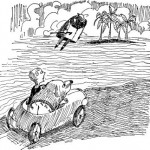Let's see what happens when we shrink the filter bubble.
Every person you follow or block, every app you use, you’re making a trade-off, the hope that this new stream of information will give you exactly what you need in exchange for closing yourself off a little more from the rest of the world.
There have been a lot of things written about “the filter bubble” in the last few years. The idea is that the people we follow, the posts matching what an algorithm thinks you’ll like, and the mobile apps that we use create a sort of illusion of information. We think it’s the whole story, but we’re getting a version of reality that we, or some program, think we want.
There are a lot of people out there who are trying to build the best bubble for you. Some may do it just by being the people you like to follow on Twitter, others (like Yahoo’s News Digest) build a little miniature internet for you, where you read what they think is important and can only use their tools to do so. There are some who are trying to figure out how to break out of the bubble, but not many. The problem is, even given the most open and free web possible, we tend to build the bubbles around ourselves. We all have our own interests and we search out the content on the internet that relates to those interests. Sometimes we don’t even know that there is something else cool out there to ask for.
The usual solution is to follow people or publications that we trust. We follow them and hope that they can do a better job of finding the things we want to read, watch and listen to than we can. Sometimes we hope that algorithms, like Facebook’s, will be able to help.
I’m not saying any of this filtering is necessarily bad. It can, but doesn’t have to, be. I do think it is worth thinking about though, as consciously and as continually as we can. I try hard to build bubbles that deform at various walls, stretching out to weird topics, people and ideas that I wouldn’t normally be exposed to, but even that is hard.
To help me think about all this (and perhaps to help you) I’ve been building sites and tools to help me look at my own information consumption and show it to others. The latest is a little something I call Dropcat, it stands for Drop Categories. I’m opening the source code today and letting anyone check out the alpha version. It has been a fun coding challenge. I’ve picked up a bunch of new ideas and skills putting it together the last few weeks; I’d never really used AngularJS before.
What’s the idea behind Dropcat? Well, it hooks into Chronoto.pe, a site where I broadcast and archive everything I read on the web. Dropcat is an experiment: how can I build a tool for others that will shrink the filter bubble to as small as it can get? The site displays the last few stories in any category that comes off Chronoto.pe. You can select a broad category, or a narrower topic underneath it. Instead of going out to the wider web, you can theoretically just use this single page. If you find a topic you like, you can leave it open, it will automatically refresh itself with the latest stories I aggregate, as soon as they come in.
If you select a category and a child category, I figure that this is the theoretical smallest bubble for filtering the wider web. As a tool, Dropcat could be more useful and I may make it so in the future. Lots more data can be made available about even the posts I have pulled in here, or I could have it automatically pull in a wider set of posts from other sites. There are lots of things it can potentially be, but right now it is just this. I sort of like it that way. Hopefully it is a useful tool in making us all think about how closed off we can make ourselves to the rest of the internet and all the information that is out there.
PS:
This isn’t the first thing I’ve done that plays with this idea of building a myopic web.
- Chronoto.pe archives everything I read and forwards users to the aggregated content while tracking them.
- It is also the engine for a daily email newsletter.
- And a Twitter account that just shows what I’ve read.





























[…] https://hacktext.com/2015/03/the-myopic-web-shrinking-the-filter-bubble-with-dropcat-2212/ […]